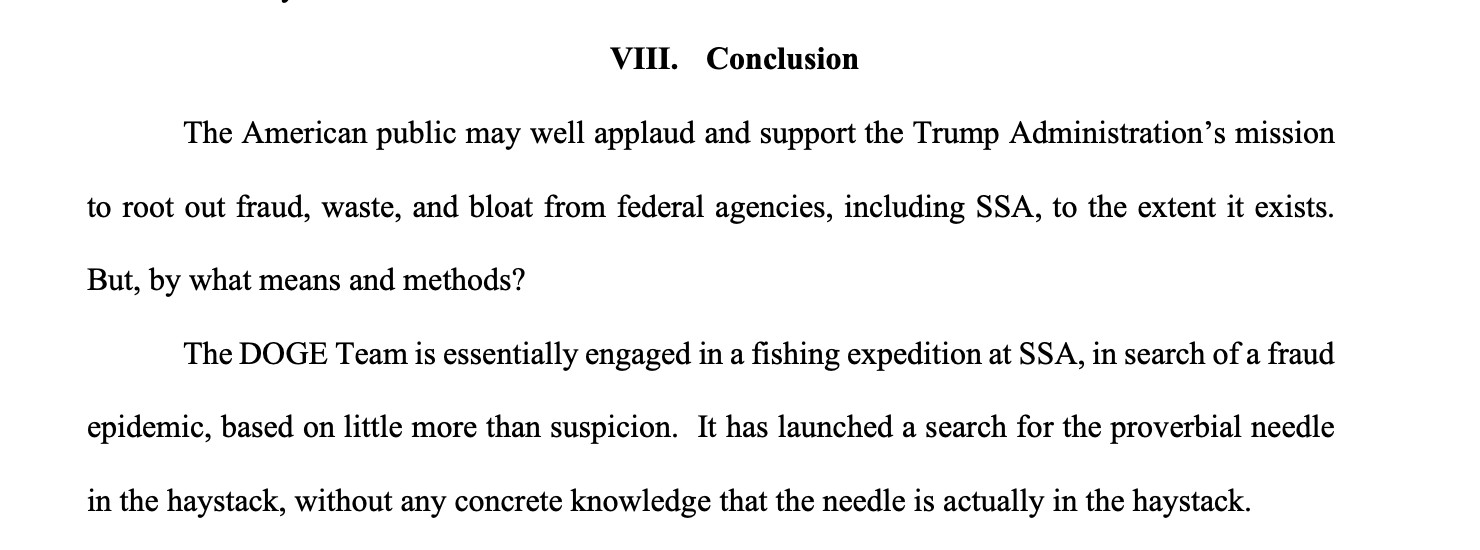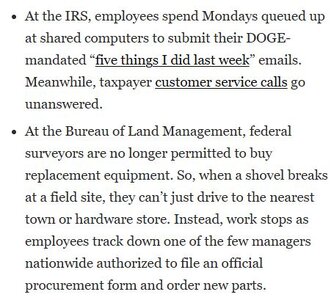The Original Gay Porn Community - Free Gay Movies and Photos, Gay Porn Site Reviews and Adult Gay Forums
-
Welcome To Just Us Boys - The World's Largest Gay Message Board Community
In order to comply with recent US Supreme Court rulings regarding adult content, we will be making changes in the future to require that you log into your account to view adult content on the site.
If you do not have an account, please register.
REGISTER HERE - 100% FREE / We Will Never Sell Your InfoPLEASE READ: To register, turn off your VPN (iPhone users- disable iCloud); you can re-enable the VPN after registration. You must maintain an active email address on your account: disposable email addresses cannot be used to register.
You are using an out of date browser. It may not display this or other websites correctly.
You should upgrade or use an alternative browser.
You should upgrade or use an alternative browser.
Tracking DOGE
- Thread starter rareboy
- Start date
- Joined
- Dec 4, 2006
- Posts
- 120,405
- Reaction score
- 31,263
- Points
- 113
yay DOGE? I love that it is 425 campsites....that is a fuck of a lot of shut out campers from all the Bumfuck counties of the US and likely a HUGE loss to the Trump supporting
areas that relied on the tourist dollars from these gypsies and their caravans.

areas that relied on the tourist dollars from these gypsies and their caravans.

- Joined
- Dec 31, 2007
- Posts
- 62,305
- Reaction score
- 15,895
- Points
- 113
Cut the staff at the IRS and revenue falls. It's a simple equation and it puts the question of tax cuts for the rich back on the table for discussion.
DOGE has said that they plan on cutting the IRS workforce by 20%. The DOGE cuts come at a time when IRS employees are reaching retirement age.
They cut 20% by firing employees who were on probation- many of whom were on probation because they had been promoted to a new position.
The Trump administration and Department of Government Efficiency are proposing a dramatic downsizing of the IRS that would result in a nearly 20% reduction of its workforce by May 15 — one month after Tax Day in the United States.
The Project 2025/DOGE plan calls for a 50% reduction in the IRS workforce.
DOGE has said that they plan on cutting the IRS workforce by 20%. The DOGE cuts come at a time when IRS employees are reaching retirement age.
Officials at the IRS and Treasury Department are anticipating tax revenue to drop more than 10% by April 15 compared with last year, The Washington Post reported Saturday, citing three people with knowledge of the situation.
The loss of tax receipts is expected as more individuals and businesses don’t file taxes or attempt to avoid paying balances owed to the IRS. The amount of lost federal revenue could top $500 billion, the paper said.
Officials said the prediction is directly linked to shifting taxpayer behavior and President Donald Trump’s cuts at the IRS, the Post said.
Thousands are expected to lose their jobs at the agency as part of Elon Musk’s Department of Government Efficiency spending reductions. Experts have warned that the cuts during tax season could materially impact filers.
They cut 20% by firing employees who were on probation- many of whom were on probation because they had been promoted to a new position.
The Trump administration and Department of Government Efficiency are proposing a dramatic downsizing of the IRS that would result in a nearly 20% reduction of its workforce by May 15 — one month after Tax Day in the United States.
President Donald Trump has ordered agencies across the federal government to turn in their “large scale” layoff plans — known as Reduction in Force, or RIF — by Thursday.
The details of the IRS proposal have been laid out in an email from DOGE and will be discussed at a meeting among agency leadership Thursday morning, according to a source familiar with the matter who asked to remain anonymous for fear of retaliation. The proposal has not been made public.
The latest round of layoffs would terminate nearly 6,800 employees — on top of about 6,700 probationary employees who have already been fired and 4,700 employees who took the “voluntary buyout” known as the “Fork in the Road” program from the Trump administration. Probationary employees are hires who generally have have been on the job for less than a year.
The Project 2025/DOGE plan calls for a 50% reduction in the IRS workforce.
The IRS is drafting plans to cut as much as half of its 90,000-person workforce, sources say
The Internal Revenue Service is drafting plans to cut its workforce by as much as half through a mix of layoffs, attrition and incentivized buyouts, according to two people familiar with the situation.
The people spoke Tuesday on condition of anonymity because they weren’t authorized to disclose the plans.
The layoffs are part of the Trump administration’s efforts to shrink the size of the federal workforce through billionaire Elon Musk’s Department of Government Efficiency by closing agencies, laying off nearly all probationary employees who have not yet gained civil service protection and offering buyouts to almost all federal employees through a “deferred resignation program” to quickly reduce the government workforce.
- Joined
- Dec 4, 2006
- Posts
- 120,405
- Reaction score
- 31,263
- Points
- 113
And there are numerous reports out there over the last two days that the IRS could collect $500 billion LESS in tax revenue this year due to DOGE cuts to the agency.
Probably a huge chunk of that will come from the rich underpaying their taxes now that so many of the audit group have been fired.
Meanwhile, Robert Reich is noting that only $7.7 billion of DOGE "savings" can actually be verified.
Probably a huge chunk of that will come from the rich underpaying their taxes now that so many of the audit group have been fired.
Meanwhile, Robert Reich is noting that only $7.7 billion of DOGE "savings" can actually be verified.
TX-Beau
FEAR THE LIBERAL DETENTE!
Another person offended by what's been fucking obvious for years.
- Joined
- Dec 4, 2006
- Posts
- 120,405
- Reaction score
- 31,263
- Points
- 113
So DOGE has cost the US about 500 million in tax revenue this year.
And they are shutting down the DoJ division that would pursue this.
Bessent is so totally fucking out of his depth...but very likely completely complicit in enabling the high wealth taxpayers to cheat and/or simply not pay their taxes.

And they are shutting down the DoJ division that would pursue this.
Bessent is so totally fucking out of his depth...but very likely completely complicit in enabling the high wealth taxpayers to cheat and/or simply not pay their taxes.

DOGE to Shutter DOJ Tax Division
I didn’t know this until this morning. And I’m surprised it hasn’t...
talkingpointsmemo.com
- Joined
- Dec 31, 2007
- Posts
- 62,305
- Reaction score
- 15,895
- Points
- 113
Well, you'll be happy to know that the DOGEkids who have access to all of the government computer systems are being paid above and beyond the maximum government salary allowed. The Department of Labor is going to pay these DOGEbags $217,000 per kiddo. The maximum government civil service employee salary is $195,200.
Note: this $1.3 million is just what they are being paid by one agency. Multiply that by each agency in the government and these kids are making a killing, while calling themselves "government employees".

 www.wired.com
www.wired.com
Note: this $1.3 million is just what they are being paid by one agency. Multiply that by each agency in the government and these kids are making a killing, while calling themselves "government employees".

US DOGE Service Agreement With Department of Labor Shows $1.3 Million Fee—and Details Its Mission
The unsigned agreement between the US DOGE Service and the Department of Labor provides significant insight into DOGE’s work with federal agencies.
US DOGE Service Agreement With Department of Labor Shows $1.3 Million Fee—and Details Its Mission
The unsigned agreement between the US DOGE Service and the Department of Labor provides significant insight into DOGE’s work with federal agencies.
Notably, the agreement, obtained by WIRED, calls for the DOL to reimburse the USDS up to $1.3 million for work done by four DOGE affiliates, or “a slightly different number,” over an 18-month period. The agreement also includes a section titled “scope of work” that details how DOGE will operate with the DOL. Together, these aspects of the agreement give the clearest look yet at how DOGE's relationships with government agencies may be structured.
- Joined
- Dec 31, 2007
- Posts
- 62,305
- Reaction score
- 15,895
- Points
- 113
And now the GAO is going to "audit" them. Of course, there's little chance that bootlicker Mike Johnson will allow the referral to the DOJ, headed by bootlicker Pam Bondi.

 www.wired.com
www.wired.com

Elon Musk’s DOGE Is Getting Audited
The Government Accountability Office’s audit examines DOGE’s handling of data at a number of federal agencies, according to sources and records reviewed by WIRED.
The Government Accountability Office’s audit examines DOGE’s handling of data at a number of federal agencies, according to sources and records reviewed by WIRED.
- Joined
- Dec 31, 2007
- Posts
- 62,305
- Reaction score
- 15,895
- Points
- 113
When the Federal Government started issuing Social Security Numbers (SSNs) back in the 1930s, the purpose was to have a number to record payroll taxes for income tax, SSI and, later in the 1960s, Medicare payments. Banks and credit bureaus began collecting SSNs and using them to identify individuals for credit tracking. From there, the SSN became a way to perpetrate identity theft.
Back in the 1990s, there was a push to implement a national identifier in the US. The Republicans threw a fit, citing libertarian fears of the government tracking people by a national ID. In typical fashion, rumors spread that the government planned on tattooing citizens with a national ID, etc.
Well... look what a Republic White House is in the process of doing... in violation of the few privacy laws that Congress has enacted.

 www.rollingstone.com
www.rollingstone.com
The pattern so far is that when Federal employees refuse to give DOGE the private data of American citizens, they fire the managers and the attorneys until they find a weak useful idiot to promote to management in order to get the information.
The DOGEkids are 20 something hackers. If you think that the information that they are collecting is going to remain in DOGE, then you're not paying attention to what is happening.
Back in the 1990s, there was a push to implement a national identifier in the US. The Republicans threw a fit, citing libertarian fears of the government tracking people by a national ID. In typical fashion, rumors spread that the government planned on tattooing citizens with a national ID, etc.
Well... look what a Republic White House is in the process of doing... in violation of the few privacy laws that Congress has enacted.

Trump and DOGE Are 'Trying to Get Around' Privacy Laws to Gather Your Personal Info
Donald Trump and DOGE want access to the personal data and information of nearly everyone in the country, including legal and undocumented immigrants.
Across the federal government, Elon Musk’s so-called Department of Government Efficiency (DOGE) has gained access to untold volumes of data containing the personal information of hundreds of millions of Americans. The data includes information like addresses, tax filings, family members, and medical records for everyone from average citizens receiving Social Security benefits, to millions of current and past federal employees, and applicants for government jobs, as well as judges who hear disputes between government agencies, companies, and everyday Americans.
Exactly what DOGE is doing with all this data seems to be an open question, according to court filings reviewed by Rolling Stone and American Doom. Those filings show that lawyers representing Donald Trump’s administration have failed to explain why DOGE needs the data. And even the simple fact that DOGE has access to this data appears to represent a blatant and widespread violation of the Privacy Act of 1974, according to plaintiffs in a slew of lawsuits directed at DOGE’s work inside the government.
The lawsuits — and DOGE’s access to reams of data at agencies like the Social Security Administration (SSA), the Treasury Department, and the Office of Personnel Management (OPM) — have prompted federal judges to issue restraining orders prohibiting DOGE from continuing to access the data. In Maryland, U.S. District Judge Deborah Boardman recently ordered that DOGE stop accessing data at the Treasury Department, saying it was likely a violation of the Privacy Act. Also in Maryland, another federal judge, Ellen Lipton Hollander, ordered DOGE to stop accessing data at the SSA that has provided Musk’s organization with the personal information of every single person in the country who possesses a Social Security number. DOGE has access not just to every U.S. citizen’s personal information thanks to the SSA data, but also anyone who has applied for or been granted Social Security numbers, like legal immigrants, according to court documents reviewed by Rolling Stone and American Doom.
The pattern so far is that when Federal employees refuse to give DOGE the private data of American citizens, they fire the managers and the attorneys until they find a weak useful idiot to promote to management in order to get the information.
The DOGEkids are 20 something hackers. If you think that the information that they are collecting is going to remain in DOGE, then you're not paying attention to what is happening.
- Joined
- Dec 31, 2007
- Posts
- 62,305
- Reaction score
- 15,895
- Points
- 113
Wall Street Journal has examined DOGE's claims to be cutting Federal waste, fraud and abuse.
It's lies.
Spending is up under Trump.
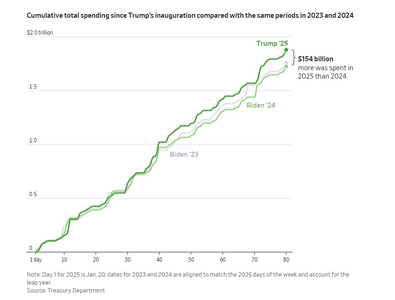
All that money being spent on Trump's weekend golf games? All that money being spent on flying immigrants on military planes? All that money for the little cosplay going on with agency heads? It adds up.
And this is before the cuts to the IRS and before the interest escalations in the 10 year US Government bonds.
It's lies.
Spending is up under Trump.

All that money being spent on Trump's weekend golf games? All that money being spent on flying immigrants on military planes? All that money for the little cosplay going on with agency heads? It adds up.
And this is before the cuts to the IRS and before the interest escalations in the 10 year US Government bonds.
Federal spending is higher since President Trump took office even as the Department of Government Efficiency slashes contracts, cuts jobs and ends diversity programs.
A Wall Street Journal analysis of daily financial statements issued by the Treasury Department found government spending since the inauguration is $154 billion more than in the same period in 2024 during the administration of President Joe Biden.
DOGE claims cuts of $150 billion so far, but the Journal analysis found those efforts have yet to affect the bottom line.
And while the government’s income—taxes and revenues including tariffs—is also up, it isn’t enough to keep pace with higher spending.
- Joined
- Dec 4, 2006
- Posts
- 120,405
- Reaction score
- 31,263
- Points
- 113
This was always part of the plan....or just as likely, is the real consequence of firing people who actually made things run. Government s have done this over and over again in the last 30 years.
Fire employees who would be entitled to benefits as part of their job and rent people on contract...usually at a higher cost over the long term.
But for many departments, they will never be able to say "we fucked up and need the people back", so instead they will put their time and money into RFQ's and RFP's to search out and hire people who work at home...the same thing they wouldn't allow their own staff to do.

 www.cbsnews.com
www.cbsnews.com
Fire employees who would be entitled to benefits as part of their job and rent people on contract...usually at a higher cost over the long term.
But for many departments, they will never be able to say "we fucked up and need the people back", so instead they will put their time and money into RFQ's and RFP's to search out and hire people who work at home...the same thing they wouldn't allow their own staff to do.

FDA to replace laid-off employees with contractors, sources say
Steep cuts to the agency's workforce had disrupted drug and food safety inspections.
- Joined
- Dec 4, 2006
- Posts
- 120,405
- Reaction score
- 31,263
- Points
- 113
Like everything else Musk says, his claims about DOGE finding savings are turning out to be hyperbolic overstatement at best and outright lies at worst. I am going for the latter reading of the situation.
But he is basically conceding defeat at this point as his junket plundering the departments for more contracts for X and SpaceX nears an end.
I suspect that even the 15% is wildly overstating the results, particularly in the context of my post above about how contractors will have to be hired now to do the work that those fired used to do.
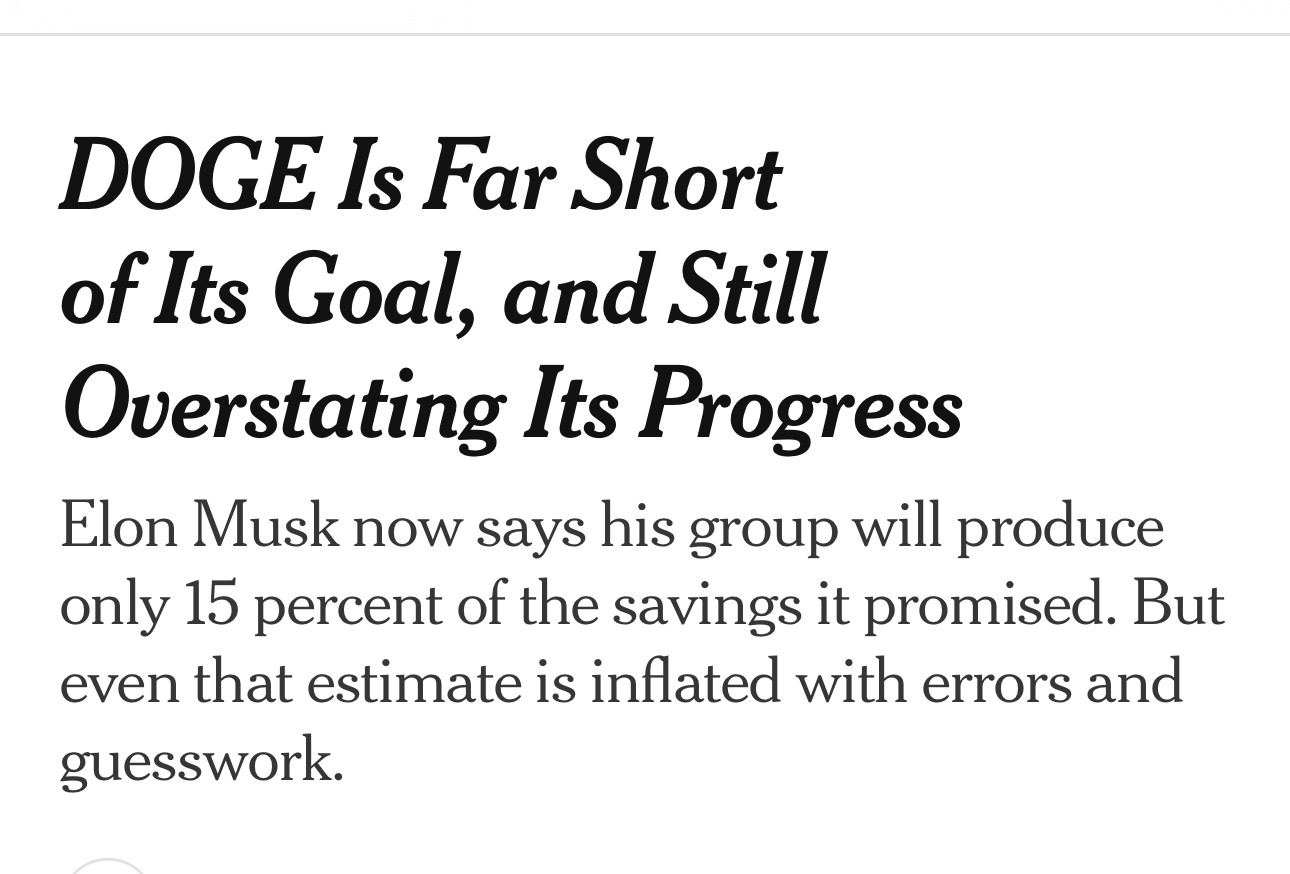
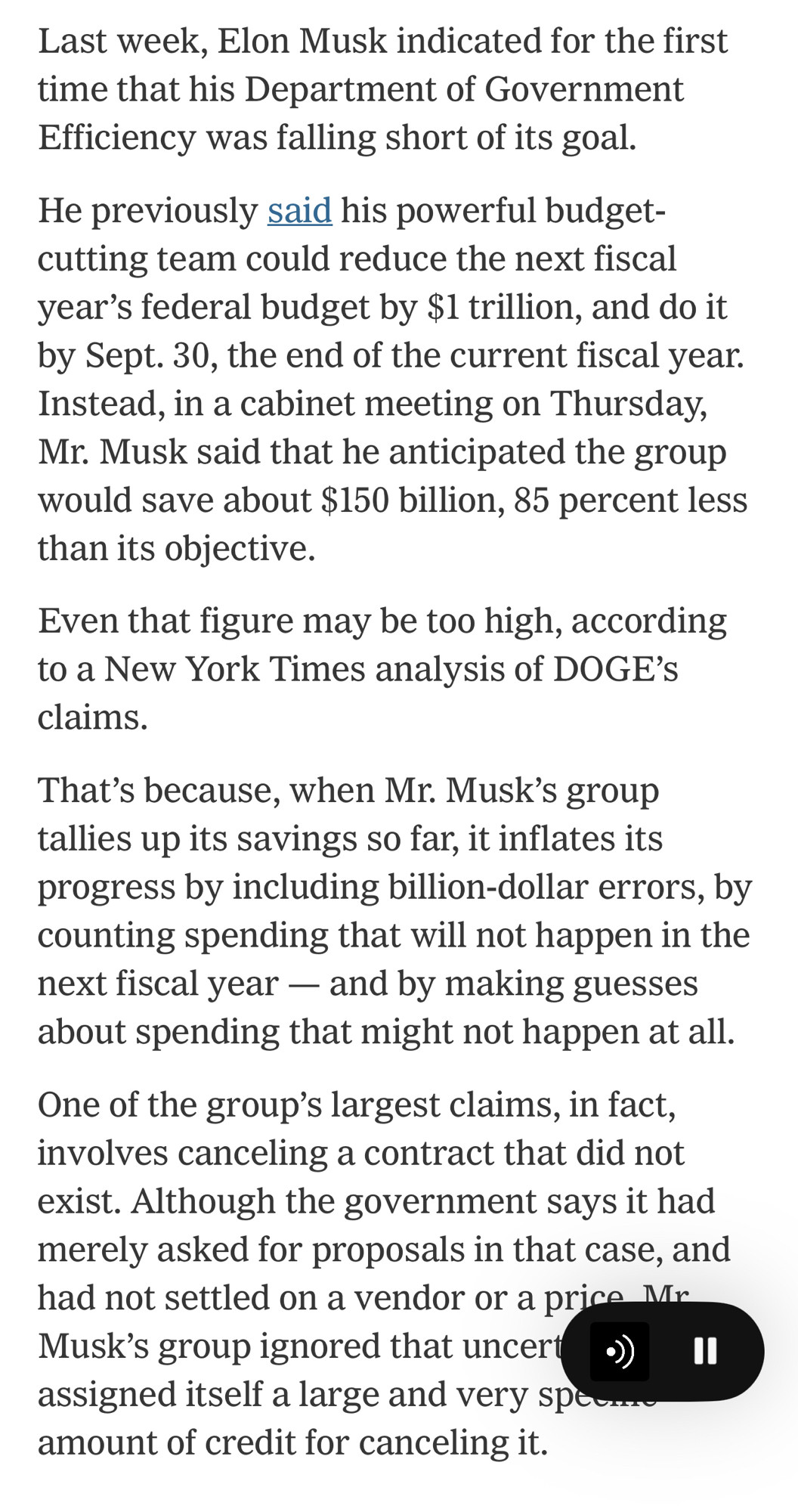
At the end of the day, we've seen it all before. Spending is actually up under TrumpCo. because of his disastrous ego driven escapades.
We know that the Trumplings won't be actually paying any attention to the reality of what DOGE achieved...if it didn't directly affect them, they will still be cheering Elon on for cutting waste by firing anyone
who might conceivably got tagged as a DEI hire.
And gutting USAID and any one time environmental grant schemes.
The latter is an important point. Cancelling one time spending is meaningless.
Only savings that carry on year after year really have any impact.
So in about a month, the whole DOGE thing will go silent as Departments enter their post-Musk slash and burn phase and get down the actual work of running their fiefdoms.
Or...Trump will announce that DOGE has found trillions in savings and that he is the hero.
He's got to get that Draft Dodger Birthday Military Parade without the cost of it blowing up in his face somehow.
But he is basically conceding defeat at this point as his junket plundering the departments for more contracts for X and SpaceX nears an end.
I suspect that even the 15% is wildly overstating the results, particularly in the context of my post above about how contractors will have to be hired now to do the work that those fired used to do.


At the end of the day, we've seen it all before. Spending is actually up under TrumpCo. because of his disastrous ego driven escapades.
We know that the Trumplings won't be actually paying any attention to the reality of what DOGE achieved...if it didn't directly affect them, they will still be cheering Elon on for cutting waste by firing anyone
who might conceivably got tagged as a DEI hire.
And gutting USAID and any one time environmental grant schemes.
The latter is an important point. Cancelling one time spending is meaningless.
Only savings that carry on year after year really have any impact.
So in about a month, the whole DOGE thing will go silent as Departments enter their post-Musk slash and burn phase and get down the actual work of running their fiefdoms.
Or...Trump will announce that DOGE has found trillions in savings and that he is the hero.
He's got to get that Draft Dodger Birthday Military Parade without the cost of it blowing up in his face somehow.
- Joined
- Dec 31, 2007
- Posts
- 62,305
- Reaction score
- 15,895
- Points
- 113
Surprised that this took so long to get reported.
So... to summarize:
All in the name of "efficiency".
So... to summarize:
- DOGE forced its way into Federal Agency computer systems.
- The DOGEbags got "god" access to the systems.
- Shortly after the DOGEbags got user accounts, Russian IPs were seen trying to access the systems via the internet, using the DOGEbags' just-issued credentials.
- They disabled controls that prevented remote access to the Agencies' systems via the internet and via mobile devices.
- Massive datasets were uploaded via Starlink.
- The DOGEbags turned off monitoring tools that logged their activities. They erased logs to hide their activities. They deleted their accounts after they downloaded the information that they were after.
All in the name of "efficiency".
In the first days of March, a team of advisers from President Trump's new Department of Government Efficiency initiative arrived at the Southeast Washington, D.C., headquarters of the National Labor Relations Board...
The DOGE employees, who are effectively led by White House adviser and billionaire tech CEO Elon Musk, appeared to have their sights set on accessing the NLRB's internal systems. They've said their unit's overall mission is to review agency data for compliance with the new administration's policies and to cut costs and maximize efficiency.
Meanwhile, according to the disclosure and records of internal communications, members of the DOGE team asked that their activities not be logged on the system and then appeared to try to cover their tracks behind them, turning off monitoring tools and manually deleting records of their access — evasive behavior that several cybersecurity experts interviewed by NPR compared to what criminal or state-sponsored hackers might do.
The employees grew concerned that the NLRB's confidential data could be exposed, particularly after they started detecting suspicious log-in attempts from an IP address in Russia, according to the disclosure.
- Joined
- Dec 4, 2006
- Posts
- 120,405
- Reaction score
- 31,263
- Points
- 113
Way back in this thread or another...as well as one that Marmite posted a video about Stacy Abrams being in trouble...DOGE was making a big thing about fraud by organizations like Habitat for Humanity and a number of others concerning environmental funding for cleaner energy at lower cost for American communities.
Then we heard that the White House was suggesting that criminal charges against parties might be filed.
Mind you, funds hadn't even actually been widely distributed, only booked and on deposit by the Biden admin.

Then we heard that the White House was suggesting that criminal charges against parties might be filed.
Mind you, funds hadn't even actually been widely distributed, only booked and on deposit by the Biden admin.




